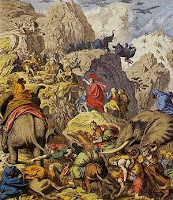
Recently we were in a group and a friend of mine received a silver old fashion fountain pen for his birthday from his wife. Without giving a second thought I blurted out "that wouldn't be an appropriate gift for a left-hander". They all looked at me with blank stares and I immediately knew that I was in a right handed world, as no one understood what was said on what seemed out from left field. Compounding the original statement, a hard time was had explaining that the ball point pen, with fast drying ink, was the world's greatest invention.
It takes a another Leftie to appreciate the accommodations required of them to fit into the "normal world".
 Throughout the world there are many things and sayings that try and belittle those who are oriented in using their left hand, but none so much as trying to write.
Throughout the world there are many things and sayings that try and belittle those who are oriented in using their left hand, but none so much as trying to write. "The hook" is the common way of explaining how Lefties write in most languages. This required in order to try and pull the pen, instead of pushing it. However, depending on the speed in which the ink dries, the result is almost always a smudged paper and ink stains on the writer's hand.
I hope my friend enjoys his new fountain pen.








